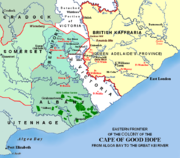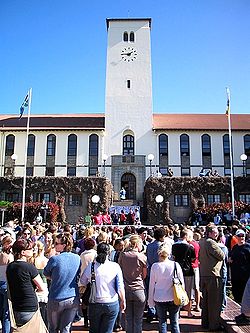
Albany, South Africa
Encyclopedia

District
Districts are a type of administrative division, in some countries managed by a local government. They vary greatly in size, spanning entire regions or counties, several municipalities, or subdivisions of municipalities.-Austria:...
in the Eastern Cape
Eastern Cape
The Eastern Cape is a province of South Africa. Its capital is Bhisho, but its two largest cities are Port Elizabeth and East London. It was formed in 1994 out of the "independent" Xhosa homelands of Transkei and Ciskei, together with the eastern portion of the Cape Province...
, South Africa
South Africa
The Republic of South Africa is a country in southern Africa. Located at the southern tip of Africa, it is divided into nine provinces, with of coastline on the Atlantic and Indian oceans...
. Grahamstown
Grahamstown
Grahamstown is a city in the Eastern Cape Province of the Republic of South Africa and is the seat of the Makana municipality. The population of greater Grahamstown, as of 2003, was 124,758. The population of the surrounding areas, including the actual city was 41,799 of which 77.4% were black,...
was traditionally the administrative capital, cultural centre and largest town of the Albany district.
The area was previously known as the 'Zuurveld' by migrating Boer
Boer
Boer is the Dutch and Afrikaans word for farmer, which came to denote the descendants of the Dutch-speaking settlers of the eastern Cape frontier in Southern Africa during the 18th century, as well as those who left the Cape Colony during the 19th century to settle in the Orange Free State,...
farmers in the late 18th century, and it lay near the boundary between the Cape Colony
Cape Colony
The Cape Colony, part of modern South Africa, was established by the Dutch East India Company in 1652, with the founding of Cape Town. It was subsequently occupied by the British in 1795 when the Netherlands were occupied by revolutionary France, so that the French revolutionaries could not take...
and the traditional Xhosa lands to the east. The 1820 Settlers
1820 Settlers
The 1820 Settlers were several groups or parties of white British colonists settled by the British government and the Cape authorities in the South African Eastern Cape in 1820....
were instrumental in settling and farming the district and giving it some of its distinctive local culture. The ANC government merged the Albany area with the large Xhosa township of Alice
Alice, Eastern Cape
Alice, a town in South Africa, is named after Princess Alice, daughter of the British Queen Victoria. Many of the current political leaders in South Africa were educated at the University of Fort Hare, also the alma mater of former President Nelson Mandela...
as the municipal area of 'Cacadu
Cacadu District Municipality
Cacadu District Municipality is situated in the Western Portion of the Eastern Cape province, covering an area of 58 242 square kilometres. The area of the district municipality includes nine local municipalities and other portions collectively known as the District Management Areas . The seat of...
' http://www.ecprov.gov.za/municipality/content.asp?PageID=1350.
History
General Jacob Glen Cuyler, the LanddrostLanddrost
Landdrost was the title of various officials with local jurisdiction. It is of Dutch origin, with land- corresponding to the English meaning of an area, suggesting a somewhat larger jurisdiction than just a village or estate; and drost being a short form of Drossaard, one of many similar titles in...
of the Uitenhage
Uitenhage
Uitenhage is a South African town with 275,185 inhabitants in the Eastern Cape Province. It is well known for the Volkswagen factory located there, which is the biggest car factory on the African continent. The town's name is pronounced by English speakers and in Afrikaans...
district, named the area between the Sundays
Sundays River
The Sundays River is a river in the Eastern Cape Province of South Africa and is said to be the fastest flowing river in South Africa. The Khoisan people originally named this river Nukakamma because the river's banks are always green and grassy despite the arid terrain that it runs...
and Fish
Great Fish River
The Great Fish River is a river running through the South African province of the Eastern Cape, it originates east of Graaff-Reinet and runs through Cradock, just south of this the Tarka River joins it...
rivers "Albany" after Albany
Albany, New York
Albany is the capital city of the U.S. state of New York, the seat of Albany County, and the central city of New York's Capital District. Roughly north of New York City, Albany sits on the west bank of the Hudson River, about south of its confluence with the Mohawk River...
in his native New York
New York
New York is a state in the Northeastern region of the United States. It is the nation's third most populous state. New York is bordered by New Jersey and Pennsylvania to the south, and by Connecticut, Massachusetts and Vermont to the east...
. Albany became the destination for the 1820 Settlers
1820 Settlers
The 1820 Settlers were several groups or parties of white British colonists settled by the British government and the Cape authorities in the South African Eastern Cape in 1820....
by the Cape Colony
Cape Colony
The Cape Colony, part of modern South Africa, was established by the Dutch East India Company in 1652, with the founding of Cape Town. It was subsequently occupied by the British in 1795 when the Netherlands were occupied by revolutionary France, so that the French revolutionaries could not take...
's new British masters. It accepted one of the largest waves of British immigrant settlers to South Africa
South Africa
The Republic of South Africa is a country in southern Africa. Located at the southern tip of Africa, it is divided into nine provinces, with of coastline on the Atlantic and Indian oceans...
, and the development of Albany was a milestone in the formation of the Anglo-African
Anglo-African
Anglo-Africans are primarily White African people of largely British descent who live or come from Sub-Saharan Africa and are Anglophone. A large majority live in South Africa...
people. Grahamstown
Grahamstown
Grahamstown is a city in the Eastern Cape Province of the Republic of South Africa and is the seat of the Makana municipality. The population of greater Grahamstown, as of 2003, was 124,758. The population of the surrounding areas, including the actual city was 41,799 of which 77.4% were black,...
, Bathurst
Bathurst, Eastern Cape
Bathurst is about 12 kilometers inland from Port Alfred, on the R67, in the Eastern Cape province of South Africa. Its chief claim to fame is that it was the administrative centre for the 1820 British Settlers who were established in the district as a buffer between the Cape Colony and the Xhosa...
, and Port Alfred
Port Alfred
Port Alfred is a small town with a population of just under 20,000 in the Eastern Cape province of South Africa. It is situated on the eastern seaboard of the country at the mouth of the Kowie River, almost exactly half-way between the larger cities of Port Elizabeth and East London and 30 km...
became important villages in Albany following the arrival of the 1820 Settlers.
Demographics
With the exception of Alice township, the region is predominantly Anglo-African and AfrikanerAfrikaner
Afrikaners are an ethnic group in Southern Africa descended from almost equal numbers of Dutch, French and German settlers whose native tongue is Afrikaans: a Germanic language which derives primarily from 17th century Dutch, and a variety of other languages.-Related ethno-linguistic groups:The...
(471,844 people - excluding those not reached in closed-gate communities) http://www.demarcation.org.za/. This aspect is often overlooked, because as a whole the Eastern Cape
Eastern Cape
The Eastern Cape is a province of South Africa. Its capital is Bhisho, but its two largest cities are Port Elizabeth and East London. It was formed in 1994 out of the "independent" Xhosa homelands of Transkei and Ciskei, together with the eastern portion of the Cape Province...
population is predominantly Xhosa.
Geographical features

The Albany area is of extreme ecological importance because of its unique indigenous vegetation, composed of deep, lush "Albany thickets
Albany thickets
The Albany thickets are an ecoregion of dense woodland near the southern point of South Africa, concentrated around the Albany region of the Eastern Cape .-Location and description:...
". Albany Thicket is an ecoregion
Ecoregion
An ecoregion , sometimes called a bioregion, is an ecologically and geographically defined area that is smaller than an ecozone and larger than an ecosystem. Ecoregions cover relatively large areas of land or water, and contain characteristic, geographically distinct assemblages of natural...
and biodiversity hotspot
Biodiversity hotspot
A biodiversity hotspot is a biogeographic region with a significant reservoir of biodiversity that is under threat from humans.The concept of biodiversity hotspots was originated by Norman Myers in two articles in “The Environmentalist” , revised after thorough analysis by Myers and others in...
of dense woodland, containing many endemic species. Ecologically it forms part of the greater Cape Floristic Region
Cape floristic region
The Cape Floristic Region is a floristic region located near the southern tip of South Africa. It is the only floristic region of the Cape Floristic Kingdom, and includes only one floristic province, known as the Cape Floristic Province.The Cape Floristic Region, the smallest of the six recognised...
.
The coastal belt is a temperate, winter rainfall area, with rains of 500 to 700 mm per annum and above.
Further to the interior, the terrain is mostly dry Karoo
Karoo
The Karoo is a semi-desert region of South Africa. It has two main sub-regions - the Great Karoo in the north and the Little Karoo in the south. The 'High' Karoo is one of the distinct physiographic provinces of the larger South African Platform division.-Great Karoo:The Great Karoo has an area of...
and grasslands composed of large commercial farms and vast expanses. Despite the arid interior, the Sundays
Sundays River
The Sundays River is a river in the Eastern Cape Province of South Africa and is said to be the fastest flowing river in South Africa. The Khoisan people originally named this river Nukakamma because the river's banks are always green and grassy despite the arid terrain that it runs...
and Fish
Great Fish River
The Great Fish River is a river running through the South African province of the Eastern Cape, it originates east of Graaff-Reinet and runs through Cradock, just south of this the Tarka River joins it...
rivers support extensive irrigated farming. They are fed by water from the Orange River
Orange River
The Orange River , Gariep River, Groote River or Senqu River is the longest river in South Africa. It rises in the Drakensberg mountains in Lesotho, flowing westwards through South Africa to the Atlantic Ocean...
under the Fish River Transfer Scheme.
Culture
GrahamstownGrahamstown
Grahamstown is a city in the Eastern Cape Province of the Republic of South Africa and is the seat of the Makana municipality. The population of greater Grahamstown, as of 2003, was 124,758. The population of the surrounding areas, including the actual city was 41,799 of which 77.4% were black,...
is still a major cultural centre. It is home to the National Arts Festival and Rhodes University
Rhodes University
Rhodes University is a public research university located in Grahamstown in the Eastern Cape Province of South Africa, established in 1904. It is the province’s oldest university, and is one of the four universities in the province...
(named after Cecil Rhodes, an important but controversial figure in Anglo-African history). The university is the authority on South African English.
The city, formed by John Graham
John Graham (Albany)
Colonel John Graham was a soldier notable for founding Grahamstown, South Africa in 1814. Grahamstown went on to become a military, administrative, judicial and educational centre for its surrounding region.-Family origins:...
, was traditionally the capital of the Albany District Council .

